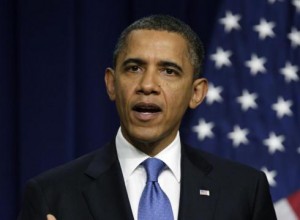 Speaking on�Iran�at last night's State of the Union,President Barack Obama�avoided�earlier administration assertions that Iran had�already�agreed to �dismantle� part of its nuclear program,�and would be required to do so�in any final deal.
Speaking on�Iran�at last night's State of the Union,President Barack Obama�avoided�earlier administration assertions that Iran had�already�agreed to �dismantle� part of its nuclear program,�and would be required to do so�in any final deal.Instead, he�stuck to�vague,�boilerplate lines, saying that the interim agreement signed in Geneva last November�had "halted�the progress of Iran's nuclear program � and rolled back parts of that program � for the very first time in a decade.�
By avoiding the use of the word "dismantle" and any explicit mention of Iran's centrifuges � issues on which the�US�and Iran have traded accusations of duplicity in recent weeks � Obama signaled that he is not about to lay down any firm markers before the negotiators meet again next month.
Obama�also vowed to veto any bill from Congress that includes new sanctions on Iran, which he said would �derail these talks.��Iran has said that any new sanctions, even if intended to only kick in if it reneges on the interim deal, are contrary to the spirit of the Geneva deal and would "kill" the talks.
�The language of dismantlement is a double-edged sword,� says Shashank Joshi, a research fellow at the Royal United Services Institute (RUSI) in London.
�On one hand, everyone knows that Iran is going to have to dismantle something in a final deal. But in Congress, �dismantlement� is a byword for complete dismantlement, a byword for complete surrender,� says Mr. Joshi. Obama �does not want to encourage lawmakers to think that this is merely a path by which they can eliminate Iran�s nuclear program, which some members of Congress still think it is.�
Iran has pushed back strongly against the frequent use of the word �dismantle� by US Secretary of State John Kerry and senior US officials, which gives the impression of Iranian capitulation.
Iran�s President Hassan Rouhani said this week that the final deal would not involve destruction �under any circumstances� of any of Iran�s 19,000 centrifuges, which enrich uranium to make nuclear reactor fuel and medical isotopes, their stated purpose (at higher levels,
they can be used for nuclear weapons).
And Foreign Minister Javad Zarif complained to CNN a week ago about official descriptions of the interim deal: �The White House version both underplays the concessions and overplays Iranian commitments,� he said. �We�re not dismantling any centrifuges, we�re not dismantling any equipment."
But Tehran has also understated its own commitments to mollify hard-line critics at home who have likened the deal to a �nuclear holocaust." After six months of portraying Iran�s outreach as an effort to find a �win-win� formula, Mr. Rouhani declared earlier this month�that the deal meant Iran had achieved the �surrender� of the US and other world powers.
Iranian officials also argue that Iran�s nuclear program and enrichment will advance without closing or significantly altering any nuclear facilities.
Despite not mentioning "dismantlement," Obama kept�another formulation that Congress expects to hear, but that has long riled Iran:�that of "all options" being available for dealing with Tehran, leaving the door open for military action.�"If Iran's leaders do not seize this opportunity, then I will be the first to call for more sanctions and stand ready to exercise all options to make sure Iran does not build a nuclear weapon," he said.
By The Christian Science Monitor�
The Iran Project is not responsible for the content of quoted articles.










